Lost luggage from around the country arrives by truck at Unclaimed Baggage in Scottsboro, Alabama.
If it’s any consolation, those headphones you left in the seat-back pocket did not just vanish into some unknowable void of lost things. Most likely, they made their way to Unclaimed Baggage, a store that occupies a full city block in Scottsboro, Alabama, where six days a week, 7,000 items, salvaged almost entirely from lost luggage, are set out for sale. The result is a democratic and dissonant array of merchandise: everything from used underwear (size XS to XXXXXL) for 99 cents to a gallon-size -Ziploc of loose Band-Aids ($13) to a $28,000 Rolex flashing with enough diamonds to pose a seizure risk.
Most major airlines send their baggage to the store, as do bus lines, resorts, casinos, rental-car agencies, and pretty much any corner of the travel sector where customers leave things behind. These companies will generally hold your lost stuff for 90 days, waiting for you to reclaim it. On day 91, orphaned goods may be picked up by Unclaimed Baggage’s lone freight hauler, whose life is apparently an unceasing schlep between America’s transport hubs and Scottsboro, a town of 15,000 greenly notched in the Appalachian foothills in the northeastern corner of the state.
Travel Issues
Travel Issues
When did vacation become so much work?
- Kyoto Has Zero Zen
- How I Fixed My Fear of Flying — By Embracing Something Worse
- Have Best of Lists Made Travel More Bland?
- The Black Americans Gentrifying Ghana
In 2024, more than 2.7 million checked bags, out of half a billion total, were damaged or lost by U.S. air carriers. Most of these were ultimately reunited with their owners, but there is a mysterious residue of about thousands of bags no one ever came to claim. Presumably, a few passengers got hit with crises — death, sickness, mayhem — more pressing than their missing bags. A few shrewd, dishonest travelers, armed with the knowledge that airlines would reimburse up to $4,700 for a lost suitcase, probably gamed the system and sacrificed a bag of dirty laundry to take a payout on a bogus claim. Others had suitcases full of contraband, which made them nervous about showing up at the lost and found. (Hard drugs are such routine finds during the initial baggage inspection in Scottsboro that workers wear nitrile gloves with Narcan close at hand. “We joke about having the sheriff’s office on speed dial,” said Sonni Hood, Unclaimed Baggage’s senior manager of PR and communications.
Because the company’s profits hinge on wholly unpredictable inventory — “We get what we get, and we don’t pitch a fit,” the store’s VP of retail told me — no salable item is discarded if it can be helped. The lowliest golf tee or mascara wand is appraised and set aside for sale. As the store has a strict prohibition on selling counterfeits, a Givenchy dress or a pair of Nikes goes to the in-house authentication department before it’s given a price tag. Jewelry is thoroughly cleaned, reportedly a job second in disgustingness only to prying earwax from earbuds.
When I first walked into the store, something felt off, but I couldn’t figure out what it was. The sales floor is clean and well lit, its sections designated in professional, laser-cut signage — none of the hand-lettered placards you see at most secondhand shops. Soon I placed the off note: It was a thrift store without the thrift-store smell. (Unclaimed Baggage, it turns out, operates the largest laundry facility in the state and washes each item before it’s priced and tagged.)
Another distinction: You don’t see a lot of absolute junk for sale. Unlike a Goodwill store, packed with items donors are glad to be rid of, Unclaimed Baggage’s stock-in-trade is people’s travel-worthy goods, often their most treasured things, stripped away by fate.
With more than 300 employees and around a million customers a year, Unclaimed says it’s second only to the beach as a tourist destination in Alabama. Ask the regular patrons why they come, and they’re likely to talk about the thrill of the hunt, usually quoting Unclaimed Baggage’s slogan: “You never know what you’ll find.” It wasn’t long before I felt the store’s deeper pull, over by the rack of abandoned wedding dresses. And, quite powerfully, at the table of men’s wallets, hundreds of them, from Velcro to Gucci. Here, you sense the spirit genie of bereft travelers clapping their pockets and howling. This is the secret soul of the place. What makes the things in Unclaimed Baggage feel rare and precious is the knowledge that somewhere, someone is probably missing them a lot.
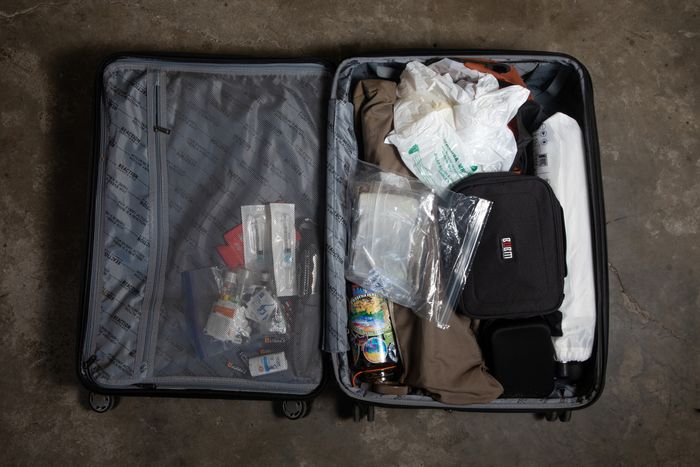
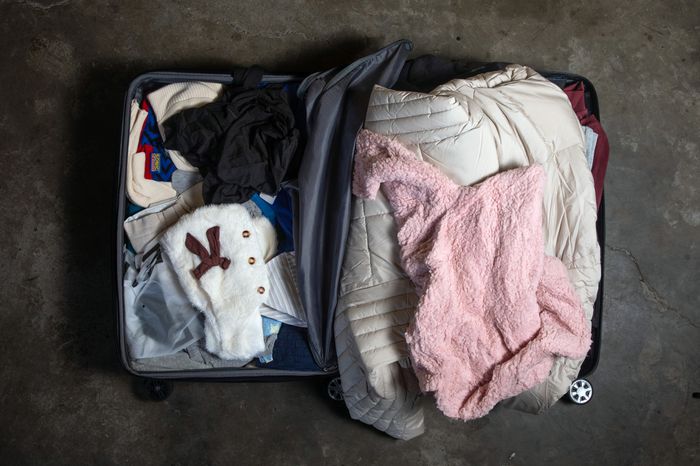

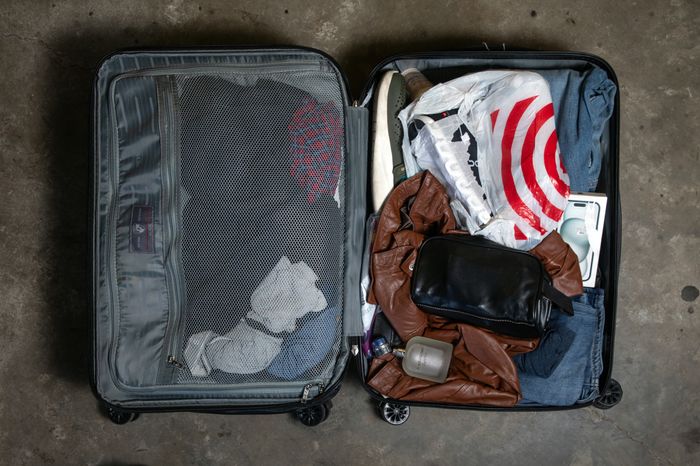
The suitcases must be inspected at the store’s processing warehouse before their contents can be sold. The suitcases must be inspected at the store’s processing warehouse before their contents can be sold.
Every afternoon, the store holds an event called the Unclaimed Baggage Experience, where volunteers get the chance to rifle through luggage fresh off the freight truck. “We do check it first to make sure there’s nothing dangerous or embarrassing in there, but otherwise it’s the real deal,” said Amanda Higgins, who was emceeing the Unclaimed Baggage Experience during my visit.
Amanda has worked at Unclaimed Baggage for seven years and came to her present role after a term as supervisor in the processing warehouse. During her tenure there, memorable cargo included a shoe with a shingle of black-tar heroin hidden in the sole and an apparently brand-new shrink-wrapped LEGO kit that rattled not with toy bricks but pellets of ecstasy. Amanda enjoyed the work but found it a little too solitary and ultimately transferred to the sales floor.
“I am nosy, but I’m more of a people person,” she said.
On a Wednesday afternoon in May, she rolled out an orange cart laden with a smallish High Sierra carry-on for public inspection. This was a slow day, and a visiting journalist was the only person around who wanted to go through the suitcase. Amanda had me put on an orange apron and a pair of blue nitrile gloves.
Though the bag had been pre-culled of hazards, Amanda hoped it might yet contain surprises: “Sometimes they miss something, so make sure you go through all the pockets because I am looking for my Christmas bonus. We just might find $500 cash in here.”
She nodded at the bag. I balked, waiting for someone to hand me a search warrant or something. Amanda bade me proceed.
“Okay, so as we get in there, it starts telling the story of maybe who this person is, where they’re going, where they’ve been,” Amanda said.
The first clue, pawed from the outer pocket, was a Lexus fob on a Spartan Race key chain, swag from one of those punishing obstacle-course races. A fitness junkie with a luxury vehicle boded well, I thought, for Amanda’s 500 bucks. She disagreed: “Just because they got a nice car and they’re healthy don’t mean they’re gonna have a good bag. One time we had a $64,000 Rolex come through here, and it was rolled up in some rags in a nasty old duffel bag.”
The next clues included a pair of size-eight Cole Haan boots, a men’s blazer, and a white button-down shirt. The blazer was made in China. The shirt, Goodfellow brand, cut against my aristocratic first impression of the bag’s owner. “I’m gonna be a little bit judgy on that shirt,” Amanda said. “It’s not a bougie brand. It’s a Target brand.”
In the toiletry case, we found a small bottle of Versace Eros cologne. A sticker on the bottle’s box reads 100% AUTHENTIC, which in Amanda’s experience meant it was probably counterfeit and therefore bound for the recycle bin. But our picture was filling out: a fit, natty, but thrifty dresser who did not want to pay a lot to smell nice. Amanda went on to deduce that the bag’s owner was young and single “because he’s smelling good. Not that old married guys don’t smell good. They’re just not gonna try as hard.”
The next brushstrokes in our portrait emerged from the toiletry bag in the form of five mysterious razor combs and a tube of Preparation H. “Well, he could be putting that on his face, because that’s supposed to help with wrinkles,” Amanda charitably observed. It seemed our traveler was either a vain man in his middle years or a dapper young athlete whose piles stemmed from an excess of squat thrusts at the gym.
But then an onlooker gave a little gasp: “He has a hairy back.” The mysterious razors, a Google search had revealed, were proprietary blades to be fitted into a back-shaving device (BakBlade). And just one blade wouldn’t do for this fellow; his situation called for five.
The suitcase was empty and its owner clear in our minds: a dainty-footed man striving via Spartan Races to compensate for his hemorrhoids and persistent dorsal pelt. “Poor little guy,” Amanda said. “Bless his heart.” Here, an excited onlooker proposed a forensic examination of the BakBlade blades to see just what kind of back hair this gentleman had, but Amanda and I felt that we’d seen enough for one day.
The Unclaimed Baggage Experience stayed with me. Through the night at the Scottsboro Comfort Inn and into the next day, I felt a kind of ghost presence of that fragrant Lexus driver into whose private life and hygiene woes I had intrusively peered. It left me feeling guilty and sad — and keen to do it again.
My next Unclaimed Baggage Experience, two days later, told a gloomier story than the first. Under scrutiny was a much-handled black nylon roll-aboard with a broken internal frame. The first items we pulled from it were a dirty Winnie-the-Pooh T-shirt and another T-shirt reading DRINKS WELL WITH OTHERS.
“Does this come from airplanes or all forms of transportation?” asked a customer, here with a school group.
“All forms of transportation,” Amanda confirmed.
“Then I’m thinking Greyhound,” the customer observed. And indeed, the suitcase did breathe forth some Port Authority–type smells.
Other items included a pair of beige flip-flops too wallowed out for resale and an autobiography workbook titled Mother’s Guided Journal. In this, someone had written, “On a cold, windy, snowy night I entered the world at 9:20 p.m.” The writer’s passion for her own life story ended there.
Deeper in the bag, we found, wrapped in tissue paper, a baby’s comb and a set of stainless-steel baby spoons. Amanda fell silent at the sight of them. “This is gonna make me cry,” she said. “I think this is somebody who made some bad choices and got separated from her family, and these spoons are the only memento she’s got of the life she used to have. I mean, why else would she travel with these unless they were super-special?”
We paused solemnly while Amanda dabbed her reddened eyes. The Unclaimed Baggage Experience, for all its voyeuristic pleasures, is inevitably laced with melancholy. The bags plunge you into all kinds of stories with lots of different nouns but just one verb: to lose.

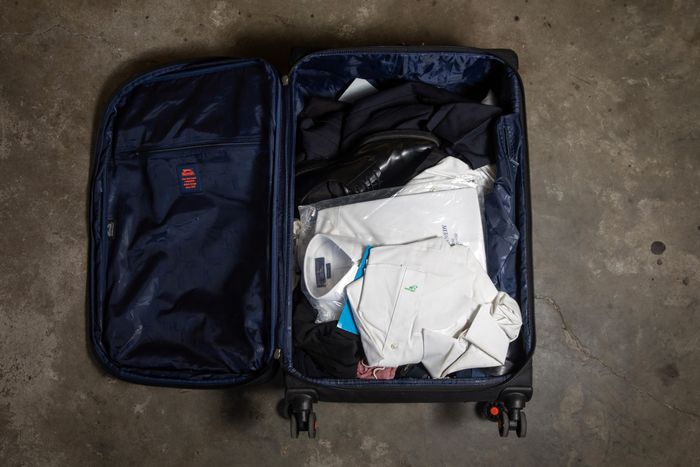

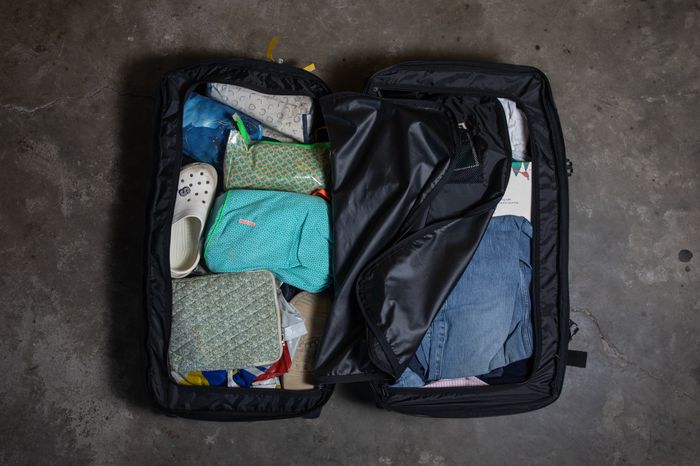
Unclaimed baggage was the brainchild of a man named Doyle Owens, a county manager for Farm Bureau Insurance and a ham-radio enthusiast. One day in 1970, Doyle was chatting with a guy in Washington, D.C., who worked for Trailways bus lines. The guy mentioned that the D.C. bus station had more lost bags than Trailways knew what to do with. Doyle decided he would buy them and bring them back to Alabama to sell. For $300, he was able to return home with a truck “heaped with bags, looking kind of like The Beverly Hillbillies,” said Bryan Owens, Doyle’s son and the current owner and CEO.
Doyle rented a house close to downtown Scottsboro, where he spread the goods on card tables and invited the town to come browse. He quickly sold out the entire haul. Soon he was selling salvaged bags from Trailways and other bus lines full time, and by the mid-1970s, he’d persuaded Eastern Airlines to sell him its stray bags as well. Within the next decade or so, after blanketing the industry with letters and cold calls, the store’s luggage dragnet had widened to pretty much every airline in America.
Click here to preview your posts with PRO themes ››
In 1995, Doyle, who was reaching retirement age, sold the business to Bryan and his wife, Sharon. When improved airline-baggage-tracking logistics reduced the volume of lost bags, Bryan expanded the business’s supply stream to passenger trains, commuter trains, rental-car companies, and unclaimed cargo, which explains why sometimes at Unclaimed Baggage you find a hundred pairs of identical earrings or 30 brand-new T-shirts reading QUIT YOUR MEANNESS. GO TO CHURCH. The company has also discovered a lost-luggage bonanza at hotels, casinos, and resorts. “If you have people drinking alcohol, you’re going to have people leaving things behind,” Bryan said. “We find opportunity where there’s chaos.”
“I wonder what’s the weirdest thing these folks ever pulled out of a suitcase” is something 100 percent of visitors to Unclaimed Baggage say out loud or think. To save everyone some time, the staff has placed a few of the more interesting finds in plexiglass cases around the store and at a small in-house museum between womenswear and children’s clothes.
Currently on display: a forged Basquiat painting (one of five; the others were turned over to the FBI); two full suits of armor (a relatively common find, owing to America’s thriving cosplay circuit); a purse made from the skin of a frog; a stuffed rattlesnake, commemorating the time a live one was found in the outer pocket of an orphaned duffel bag; a violin made by an apprentice of Antonio Stradivari; and a drumhead signed by members of the band Kings of Leon.
A five-minute chat with random strangers gets you into another museum, the provocative museum of Unclaimed Baggage folklore, authored and updated daily by nearly everyone who works or shops here regularly.
“There’s been an urn or two bought here that had ashes in ’em,” the town coroner told me. The store manager mentioned a 40-carat raw emerald found stuffed in a sock. “This was back when all the Colombian drug money was flying around Miami and it was easier to go through Customs with an emerald between your toes than a bunch of hundred-dollar bills,” he said. One customer told me about a friend who bought a jug of fabric softener at the store, “and it had finger condoms in it full of $30,000 or $40,000 worth of cocaine. The police got involved, of course, and they destroyed it.”
A guy I ate a sandwich next to at a Scottsboro restaurant was excited to tell me this: “My wife works over in that warehouse where they open up the bags, and you just wouldn’t believe how many sex toys come through there. And the folks going through the bags, it’s a lot of these little old Church of God people who never saw a dildo before in their life, so they’re pulling out these things that just start buzzing and wiggling and wobbling and everybody’s hollering, ‘Oh, Lord, have mercy!’”
On one visit to the sales floor, I spoke with Erin Martin, a senior product authenticator from the unincorporated community of Dogtown. Martin has never lived outside Alabama, and she has also never set foot in an Hermès store, but she is probably the region’s foremost authority on Birkin bags. “We had this one Birkin come through,” she recalled. “Probably a $25,000 bag — pray for whoever lost it, but wow — and I’m seeing all these tiny little white specks all over it. Well, I did some research and it turns out they were fat deposits that’ll seep out of the leather under certain humidity and temperature levels, which is gross.” Boldly, she tried to fix the problem with a hair dryer: “I’m sitting in my office with a bag that’s worth more than my car, going over it with a $7 hair dryer. The fat just melted right back into the leather. It was perfect.”
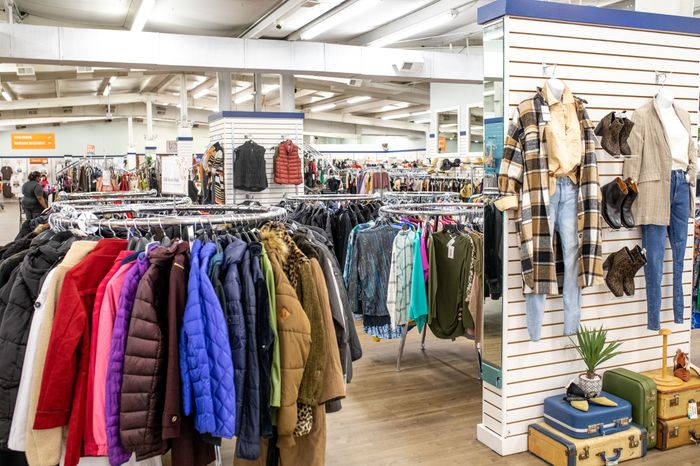
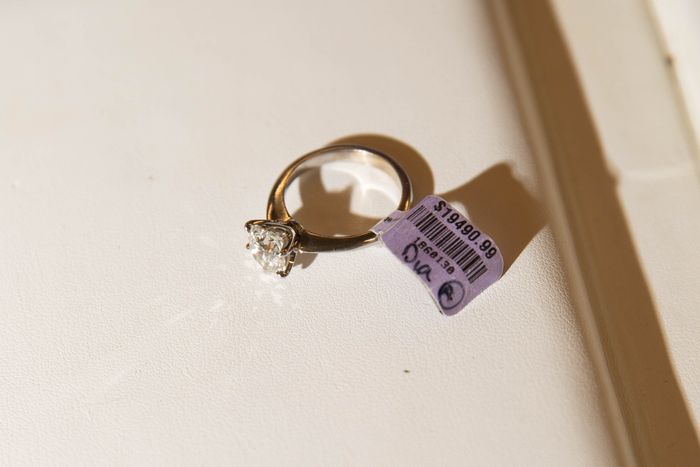
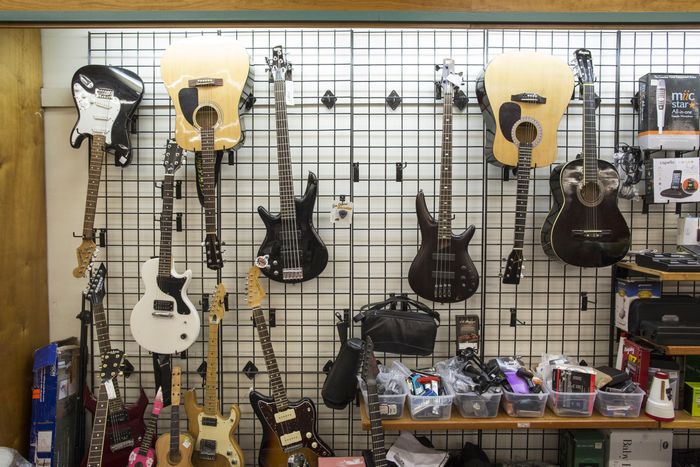
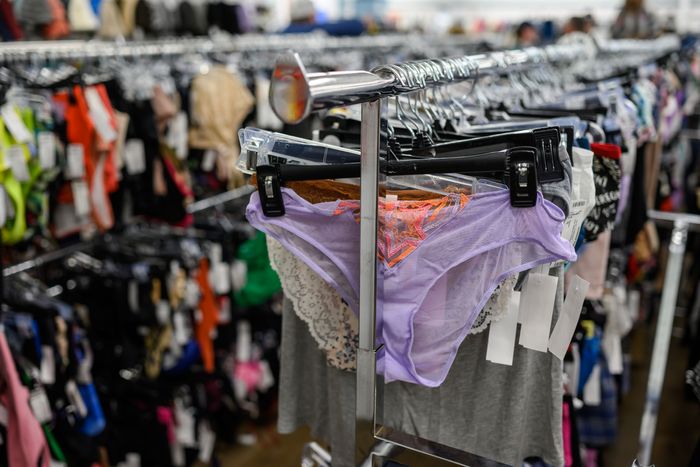
The store’s clean and well-lit sales floor has everything from used underwear to wedding dresses. The store’s clean and well-lit sales floor has everything from used underwear to wedding dresses. more The store’s clean and well-lit sales floor has everything from used underwear to wedding dresses.
Toward the end of my visit to Scottsboro, I met Wade DuBose, who has been coming to the store just about every day for 40 years. He is there most mornings at 9 a.m. when it opens. He’ll often stop by on his lunch break and then again around 5 p.m. on his way home.
I met with Wade one afternoon in the mezzanine section, where the store was selling Kindles, iPhones, guns, computers, headphones, smart-rings, and every state-of-the-art thing people take on a plane. Wade wasn’t interested in any of that. He was looking at a tub of miscellaneous junk, at the bottom of which he expertly spied a brass Zippo lighter. He bought it for $4. “It’s probably worth $20,” he said. This middling score he would either keep for his own collection or lay off at a consignment store in town.
The mysterious thing about Wade is that he is a successful electrician whose time would be more lucratively spent electricianing than rummaging around for deals. But for Wade the search itself seems to bring an enrichment more gratifying than money. He is a kind of beachcomber, hooked on the uncertain rewards of what the tides toss up each day. “People say, ‘Man, you’re really addicted,’” he said. “My wife keeps telling me, ‘Wade, you need to stay out of that Unclaimed.’”
Wade’s attachment to the store caught hold in what veteran shoppers refer to as the good old days of Unclaimed Baggage, the days before the internet, when the store didn’t always know the value of what it put on the shelves. “I’d find a $20,000 wristwatch for, like, $8. Now, they research everything they put out,” he said. “It used to be I’d find something unique every day. Now, if you’re lucky, it’s maybe every two weeks.”
Over the years, Wade has bought so much stuff at Unclaimed Baggage that he recently had to purchase a warehouse to keep it in. His building, which sits just across the railroad tracks from the store, is a windowless cottage of corrugated sheet metal that Wade got for the bargain-basement price of $10,000.
One afternoon after work, he led me into a warren of rooms crowded with display cases, storage bins, and shelves overloaded with jumbled goods. It was as hectically entrancing as a Joseph Cornell memory box. Items in his collection include an old pay phone, water meters, canvas bank-deposit bags, several cash registers, rusted barrel hoops, a closet full of basketball jerseys, a biography of Albert Schweitzer, coffee percolators, fire extinguishers, a gas mask, belt buckles, woodworking books, BB guns, and a harness for TSA service dogs embroidered DO NOT PET.
The high-value finds he stores in a couple of safes at one of the nearby rental homes that, like pocketknives, he also collects. I got the sense that he hadn’t totally intended to show me the contents of these special safes. But after I toured his warehouse, maybe because I didn’t make him any lowball offers or imply that he has a hoarding problem, he granted me a peek at his inmost cache of finds.
Wade is a soft-spoken, undramatic man, but after he’d keyed in the combo to the largest of his vaults, he stood grinning for a moment, a giddy, theatrical light playing in his eyes. “This,” he said, swinging wide the steel door, “is what I do.”
At first glance, it seemed that what Wade mostly does is guns: rifles, shotguns, pistols, all scored at Unclaimed Baggage. It’s unusual for the things he buys to give up clues to their former lives, but one shotgun he got at the store did reveal an inconvenient past when a friend borrowed it. “Next thing I know, he went down to the pawnshop and tried to pawn it,” Wade said. Fortunately, the pawnshop’s owner notified Wade of this treachery. Less happily, he also told Wade that the shotgun had been reported missing, so he’d had to turn it over to the police. (Unclaimed Baggage, Wade said, reimbursed him.)
But there was a good deal more in there than that. Wade pulled out a plastic tub and set it on the floor. He chuckled, gazing fondly at all the gleaming wealth inside: antique pocket watches; Bulova, Panerai, Le Vian, and Patek Philippe wristwatches worth many thousands; plus a James Bond Omega, a $5 grab-bag find that is now enshrined in store lore. He showed me rare coins and unrare coins, ceremonial rings, knives ranging from run-of-the-mill Swiss Army miniatures to hand-forged Damascus steel, military medallions, and too many other small shiny items to appraise or inventory before the door clunked shut on the trove.
I had the poor taste to ask Wade what he thought the whole collection was worth. He smiled, shook his head, and set the question aside. For him, the deepest value is “just the thrill I get going through it. Each time I go through this stuff, I see something I forgot I had.”
I thought about that. I’d always supposed the collector — or hoarder, as Wade’s wife and concerned friends may see him — to be a depressed, defeated sort of person, bobbing helplessly in the rising flood of their own clutter. But Wade’s vault was an expression of joy, a glee freezer that preserved his treasures from the banality of actually using them, shielded them from the anguish of loss by theft or sale, and suspended them in their exultant foundness, perpetually.
I attempted to buy a bunch of things at Unclaimed Baggage. I spent a long time wincing at myself in a dressing-room mirror, trying to look at ease in other people’s clothes, but in the end I put most of it back. After four days in the store, I was too beset by the gray ghosts of baby spoons and back shavers to fend off the past life of even a bucket hat.
And it wasn’t just the luggage of others. Back at the hotel, packing up to go, I felt put upon by my suitcase and its contents. It steals a march on us, our stuff. Casually enough, you buy a shirt, and soon, without really consenting to the arrangement, you find yourself thinking, I am a guy who wears this shirt. The paraphernalia estrangement the store infected me with was a miniature version of the helpless feeling you get in really big cemeteries or in that church with all the skulls in Rome. If you were wiser, you would treasure your own carcass (and carry-on) a little less.
It was wearying to think how much of me would go with my luggage if I lost it on my way home and how little it would mean to a stranger rooting through it at the Unclaimed Baggage warehouse. Splayed across the hotel’s faintly sticky dresser were my judiciously chosen travel clothes; the fancy socks I never wear at home; my noise-canceling headphones with their cozy, humid cups; a stowaway LEGO cop whose hands my son gnawed off when he was little; a smooth liver-colored stone my wife plucked for me from a Scottish beach; my identity-totalizing personal electronics; my passport, whose haggard photo I loathed when it was taken, though I am even haggarder now. I opened my suitcase and zipped these traces of myself away, despising them a little.
Thank you for subscribing and supporting our journalism. If you prefer to read in print, you can also find this article in the June 30, 2025, issue of New York Magazine.
Want more stories like this one? Subscribe now to support our journalism and get unlimited access to our coverage. If you prefer to read in print, you can also find this article in the June 30, 2025, issue of New York Magazine.


